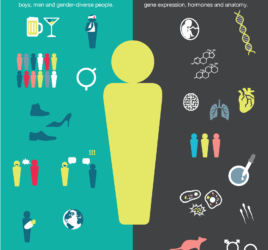
Why we should not call men “a little bit autistic”
Imagine this radio commercial:
Woman: “We have been together for a year now, and I feel the need to have more space…”
Man: “I completely understand! I have already been thinking about a solution. We could opt for the new special edition of *a car brand* containing much more space than the car we have now, and other special features…”
This commercial exploits the typical gender stereotype that women are more likely to be talking about feelings and relationships, while men are more likely to be talking about machines and gadgets. Many people recognize these talking patterns, and, as a researcher interested in autism, more than once people have asked me whether all men are not “a little bit autistic”.
“How much of this statement is true, according to psychological science?”
When asking men and women about their cognitive styles – the ways they think – they typically confirm to these gender stereotypes. The average woman self-reports a higher capacity to analyse and understand other people. This is often assessed by means of the Empathy Quotient (EQ) questionnaire, which includes items such as “I can easily tell if someone else wants to enter a conversation” or “I really enjoy caring for other people” (Baron-Cohen, 2009; Groen, Fuermaier, Den Heijer, Tucha & Althaus, 2015). At the same time, the average man reports a higher capacity to analyse, create, and understand systems. The Systemizing Quotient (SQ) assesses this capacity with items such as “When I look at a building, I am curious about the precise way it was constructed” or “When I have a lot of shopping to do, I like to plan which shops I am going to visit and in what order” (Baron-Cohen, 2009; Groen, et al., 2015).
However… most men and women are not average. Even though effect sizes of differences between men and women are medium to large, which is substantial from a statistical point of view, there still is 60% up to 80% of overlap of scores between men and women (Magnusson, 2014; see http://rpsychologist.com/d3/cohend/ for an interactive visualization of this phenomenon).
“Therefore, more men and women are similar than different in their self-reports of empathy and systemizing. Thus at least we should not call all men a little bit autistic.”
Nonetheless, the balance between self-reported empathy and systemizing has been found to predict a person’s level of autistic traits (Wheelwright, Baron-Cohen, Goldenfeld, Delaney, Fine, & Smith, 2006). That is, people scoring low on empathy relative to systemizing are more likely to have autistic traits. These lower relative scores are more prevalent in men. And in people diagnosed with autism. But many studies showed that lower relative scores cannot accurately predict whether you have the disorder or not (Groen et al., 2015). Actually, these scores appeared much better predictors of whether you are studying in the field of physical sciences or in social sciences (Groen, Fuermaier, Tucha, Koerts, & Tucha, 2018)!
Autistic traits are often assessed using the Autism Spectrum Quotient, which contains items such as “Other people frequently tell me that what I’ve said is impolite, even though I think it is polite”, “I find it hard to make new friends”, or “I would rather go to a library than a party”. These specific traits of autism are normally distributed across the population, meaning that everyone possesses some of these traits to a certain extent. However, only ~1% of the population possesses a constellation of many of these traits that is impairing for that person. These people are considered ‘on the autistic spectrum’. They suffer from a problematic development of social relationships and communicative skills, and are stuck in maladaptive behaviour patterns, or restricted interests.
“Thus, in order to call someone “autistic”, a constellation of autistic traits should be present that is impairing the person’s development and life.”
Men and women may have communicative misunderstandings because of differences in cognitive style or the presence of some autistic traits, but these are often easy to solve and do not impair our lives or our relationships. Therefore, in my opinion, we should not call our men “a little bit autistic”. As Uta Frith, an authority in the field of developmental psychology and autism, put it: “If you think you are a little bit autistic you probably are not!” (BBC, 2014; http://www.npo.nl/focus-leven-met-autisme/14-12-2014/VPWON_1220927).
Much psychological research tries to understand the communicational misunderstandings between men and women by means of self-report, but there are also biological explanations. Currently, a pattern is emerging from neuroscience that women in particular have an advantage in affective empathy, meaning the more emotional and automatic aspects of empathy. Yet, sex differences are only minimal for cognitive empathy, meaning the more controlled and reasoned aspects of empathy, which include perspective taking and mentalizing (for a detailed review see Christov-Moore, et al., 2014). Thus, the “average man” picks up or expresses emotions less automatically than the “average woman”. More men than women see the rational side of problems first. As a woman, I have to admit that this cognitive style of men oftentimes helps me to relativize my (emotional) problems and simplifies solutions. This is one of the reasons I appreciate the men in my life, and surely I would not call them autistic for that.
Relevant literature:
American Psychiatric Association (2013). Diagnostic and Statistical Manual of Mental Disorders, fifth edition. Arlington, VA, American Psychiatric Association. Section II: Diagnostic criteria and codes; Neurodevelopmental Disorders; Autism Spectrum Disorders. http://proxy-ub.rug.nl/login?url=https://doi.org/10.1176/appi.books.9780890425596.dsm01
Baron-Cohen, S. (2009). Autism: The empathizing – systemizing (E-S) theory. Year in Cognitive Neuroscience, 1156, 68-80. doi:10.1111/j.1749-6632.2009.04467.
BBC (2014, December 14). Life with autism. Retrieved from: http://www.npo.nl/focus-leven-met-autisme/14-12-2014/VPWON_1220927
Christov-Moore, L., Simpson, E.A., Coude, G., Grigaityte, K., Iacoboni, M., & Ferrari, P.F. (2014). Empathy: Gender effects in brain and behavior. Neuroscience and Biobehavioral Reviews, 46, 604-627. doi:10.1016/j.neubiorev.2014.09.001
Groen, Y., Fuermaier, A. B. M., Den Heijer, A. E., Tucha, O., & Althaus, M. (2015). The empathy and systemizing quotient: The psychometric properties of the Dutch version and a review of the cross-cultural stability. Journal of Autism and Developmental Disorders, 45, 2848-2864. doi:10.1007/s10803-015-2448-z.
Groen, Y., Fuermaier, A. B. M., Tucha, L. I., Koerts, J., & Tucha, O. (2018). How predictive are sex and empathizing-systemizing cognitive style for entry into the academic areas of social or physical sciences? Cognitive Processing, 19(1), 95-106. doi: 10.1007/s10339-017-0848-z
Magnusson, K. (2014, February 3). Interpreting Cohen’s d effect size an interactive visualization. Retrieved from: http://rpsychologist.com/d3/cohend/
Wheelwright, S., Baron-Cohen, S., Goldenfeld, N., Delaney, J., Fine, D., & Smith, R. (2006). Predicting autism spectrum quotient (AQ) from the systemizing quotient-revised (SQ-R) and empathy quotient (EQ). Brain Research, 1079(1), 47-56.



